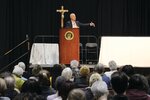


SMITHFIELD — More than 600 faithful filled the hall at Bryant University, Saturday morning where Mass was held to open the Diocese of Providence’s 57th annual Faith Formation Convocation. The yearly event offers continuing theological training for catechists, religion teachers and others in similar ministries.
Organized by the Office of Faith Formation, this year’s convocation theme was “Come to Me,” with many talks and workshops centering on questions of how to deepen one’s relationship with Christ, particularly within the context of prayer and the Eucharist.
Throughout the day, workshops were offered in both English and Spanish by local catechists, clergy, religious and scholars of theology on a variety of different topics, including the Eucharist and the Sacraments, different methods of evangelization, and how to communicate the truth of the Catholic faith with regard to certain controversial contemporary moral and social issues. Reconciliation was also offered to those in attendance, as well as Eucharistic Adoration.
Many of those present at the Convocation felt deeply touched by the day’s events. “It’s enlightening to see that we have to have a deeper relationship with Jesus Christ so that we can get closer to Him,” said Adilson Fontes, a parishioner of Our Lady of Fatima parish in Cumberland.
“It was really impactful, and it was very true. And I think it was an amazing message for all Catholics,” said Nick Rodrigues, a parishioner at St. Patrick’s Parish in Providence.
“I think the coming back to personal prayer as the foundation of all our good works is something I need to be reminded of, feeling like I’m a busy person, coming back to personal prayer with Jesus in the Eucharist,” said Ealish Brawley, a parishioner at St. Pius V Parish in Providence.
Former Auxiliary Bishop Robert C. Evans celebrated the Mass and Father Robert H. Forcier, pastor of St. Mary Star of the Sea Parish in Narragansett, concelebrated.
Bishop Evans began his homily by bringing to the attention of those present the fact that the Christian message is not always widely accepted.
“We cannot pretend that our message – or, more acutely, God’s message – is always welcome, even by our own people,” Bishop Evans noted.
He cited as an example of this those elements of Catholic morality and anthropology considered controversial by modern society. All of this reflects, Bishop Evans explained, a more fundamental reality, namely that, due to the Fall, life is a constant struggle against sin.
“There is, truly, a war between good and evil, and there is no demilitarized zone in that war, there is no treaty or truce in that battle for our immortal soul,” Bishop Evans said, going on to state, “One of the first challenges we have is to convince our people what the stakes are. We’re all going to live forever [after we die], but [the question is] where we are going to live forever, and that’s determined by whether we put God first in our lives, or last.”
“We cannot guarantee success [in spreading the faith], but we are responsible for trying to pass on the faith,” Bishop Evans continued. “We should never grow discouraged. As St. Teresa of Calcutta often said, ‘God never expected us to be successful. But he does expect us to be faithful.’ At the very heart of our faith is not a code of conduct or a set of rules — these exist, but in a subordinate manner — but a relationship with Jesus Christ.”
Mass was immediately followed by a presentation by the keynote speaker, Catholic author and apologist Matthew Leonard. The son of a Protestant pastor, Leonard converted to Catholicism in his late 20s. Going on to receive a master’s degree in theology from Franciscan University of Steubenville, he has published books and documentaries on a variety of topics connected with Catholic theology and spirituality.
Titled “Further Up, Further In: A Spiritual Clarion Call for Catholics,” Leonard’s talk began with the claim that Mount Tabor and the Garden of Gethsemane represents two key elements of the spiritual life.
“The Mountain shows us the prize; the Garden shows us how we’re supposed to get there,” Leonard said.
The events surrounding the Transfiguration, in which Jesus brought the Apostles Peter, James and John to the top of Mount Tabor and manifested his glory to them, was meant to show what the goal of the divine plan of salvation is.
“He [Jesus] was showing them their destiny. He was showing them what the end game of the Catholic life is really all about: movement into the divine family of God, becoming a participant, a partaker of the divine nature of God.”
According to Catholic theology and spirituality, to take part in the divine nature involves being filled with the divine love and being conformed to God. This is possible because of the Incarnation. By taking on human flesh, Leonard pointed out, Jesus united his divine nature to our human nature. Leonard went on to explain how the sacraments communicate the effects of the Incarnation through sanctifying grace. This is true especially with the Eucharist.
“St. Thomas Aquinas says that when you receive the Eucharist, you partake in the food capable of making man [share in the divinity of Christ]. St. Augustine says about the Eucharist, ‘If you receive well, you are what you have received’,” Leonard said. “The evil one has been attacking this doctrine from the very beginning. He knows full that if we really understood what it is God is offering us in the Holy Eucharist, we would be building our lives around it.”
In his second lecture, titled “Why The Cross: How the Death and Resurrection Actually Saves You,” Leonard discussed how certain core features of the Catholic life are represented by the events surrounding Jesus’ passion and death. Leonard noted how the death of Christ was the perfect sacrifice for the forgiveness of sins, since it accomplished what mankind, as a result of sin, failed to do, namely acting out of perfect love for our heavenly father, claiming on the cross Christ “receive[d] the love that God was giving…on our behalf, and giving it back to God, and make humanity, through Himself, sacrificial once again.”
Leonard concluded, noting that it is only in imitating the spiritual truths symbolized by the Transfiguration and Death of Christ that we can properly evangelize.
“You have to go there if you are to show other people how they’re supposed to enter into intimacy with Almighty God as well.”